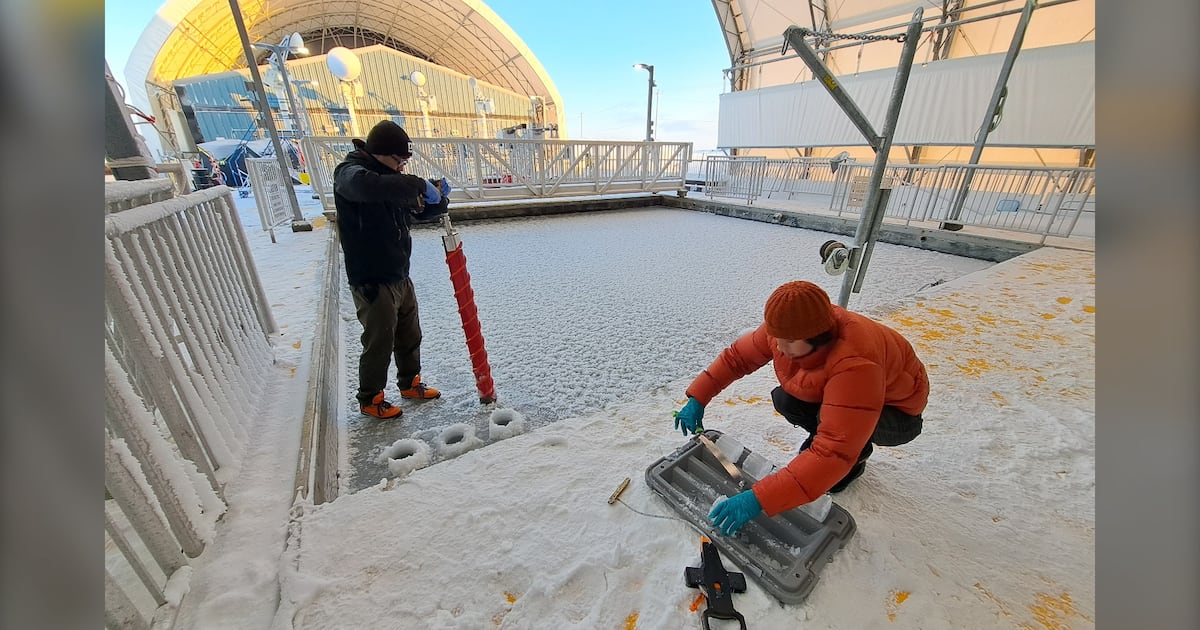Science
Churchill Marine Observatory Marks One Year of Arctic Research

A multidisciplinary research facility in Churchill, Manitoba, dedicated to Arctic science, is celebrating its first anniversary. The **Churchill Marine Observatory (CMO)**, which officially opened on **August 27, 2024**, aims to address complex questions with significant socioeconomic implications for the region.
Dr. **Feiyue Wang**, project lead at the **University of Manitoba** and professor at the **Clayton H. Riddell Faculty of Environment, Earth, and Resources**, emphasized the importance of the CMO in enhancing Manitoba’s presence in marine research. The facility, which has an investment of approximately **$45 million**, allows for various studies by drawing seawater from the **Hudson Bay** and the mouth of the **Churchill River**.
Research Capabilities and Projects
Dr. Wang explained that the facility’s design enables experimental studies focused on the rapid environmental changes occurring in the Hudson Bay area. “This kind of arrangement allows us to do experimental studies, to study different scenarios as the Hudson Bay environment areas are going through rapid change,” he said. By testing various scenarios, researchers aim to acquire knowledge that will help prepare the region for future challenges.
The CMO is equipped to conduct research on risk reduction and mitigation strategies, particularly in response to potential oil spills. In addition to marine studies, the observatory investigates how freshwater influences the marine ecosystem in **Hudson Bay**. The facility features sensors molded to the bottom of the **Churchill River** and **Hudson Bay**, enabling researchers to monitor both physical and biological properties of the water. Mobility for sampling and monitoring is provided by the research vessel, the **William Kennedy**.
Between **November 2024** and **February 2025**, the CMO supported three significant research projects. One project involved a collaboration with Danish researchers to study the initial stages of thin ice formation. Another ongoing study examines whether natural microorganisms can degrade oil in ice-covered waters, a crucial consideration in the event of an oil spill. Dr. Wang noted that data from this study, led by a colleague, is currently being analyzed, with plans for further research this winter.
Community Involvement and Future Directions
Looking to the future, Dr. Wang expressed his desire to see increased participation from Indigenous researchers and community members. He highlighted the importance of local knowledge and investment from those who call the region home. “Folks who live there, who call that region home, are the ones who are going to be more invested in it,” he stated.
While the CMO has already incorporated some community involvement, Dr. Wang aims for this participation to become a more prominent aspect of the facility’s research direction. He believes that the insights from local residents can enhance the understanding of the region’s unique environmental challenges.
As the Churchill Marine Observatory marks this significant milestone, its commitment to advancing Arctic science and fostering local engagement positions it as a vital resource for understanding and addressing the complexities of the changing environment in the North.
-

 Education4 months ago
Education4 months agoBrandon University’s Failed $5 Million Project Sparks Oversight Review
-

 Science5 months ago
Science5 months agoMicrosoft Confirms U.S. Law Overrules Canadian Data Sovereignty
-

 Lifestyle5 months ago
Lifestyle5 months agoWinnipeg Celebrates Culinary Creativity During Le Burger Week 2025
-

 Science5 months ago
Science5 months agoTech Innovator Amandipp Singh Transforms Hiring for Disabled
-

 Health5 months ago
Health5 months agoMontreal’s Groupe Marcelle Leads Canadian Cosmetic Industry Growth
-

 Technology5 months ago
Technology5 months agoDragon Ball: Sparking! Zero Launching on Switch and Switch 2 This November
-

 Education5 months ago
Education5 months agoNew SĆIȺNEW̱ SṮEȽIṮḴEȽ Elementary Opens in Langford for 2025/2026 Year
-

 Education5 months ago
Education5 months agoRed River College Launches New Programs to Address Industry Needs
-

 Business4 months ago
Business4 months agoRocket Lab Reports Strong Q2 2025 Revenue Growth and Future Plans
-

 Technology5 months ago
Technology5 months agoGoogle Pixel 10 Pro Fold Specs Unveiled Ahead of Launch
-

 Top Stories4 weeks ago
Top Stories4 weeks agoCanadiens Eye Elias Pettersson: What It Would Cost to Acquire Him
-

 Technology3 months ago
Technology3 months agoDiscord Faces Serious Security Breach Affecting Millions
-

 Education5 months ago
Education5 months agoAlberta Teachers’ Strike: Potential Impacts on Students and Families
-

 Business1 month ago
Business1 month agoEngineAI Unveils T800 Humanoid Robot, Setting New Industry Standards
-

 Business5 months ago
Business5 months agoBNA Brewing to Open New Bowling Alley in Downtown Penticton
-

 Science5 months ago
Science5 months agoChina’s Wukong Spacesuit Sets New Standard for AI in Space
-

 Lifestyle3 months ago
Lifestyle3 months agoCanadian Author Secures Funding to Write Book Without Financial Strain
-

 Business5 months ago
Business5 months agoNew Estimates Reveal ChatGPT-5 Energy Use Could Soar
-

 Business3 months ago
Business3 months agoHydro-Québec Espionage Trial Exposes Internal Oversight Failures
-

 Business5 months ago
Business5 months agoDawson City Residents Rally Around Buy Canadian Movement
-

 Technology5 months ago
Technology5 months agoFuture Entertainment Launches DDoD with Gameplay Trailer Showcase
-

 Top Stories4 months ago
Top Stories4 months agoBlue Jays Shift José Berríos to Bullpen Ahead of Playoffs
-

 Top Stories3 months ago
Top Stories3 months agoPatrik Laine Struggles to Make Impact for Canadiens Early Season
-

 Technology5 months ago
Technology5 months agoWorld of Warcraft Players Buzz Over 19-Quest Bee Challenge









